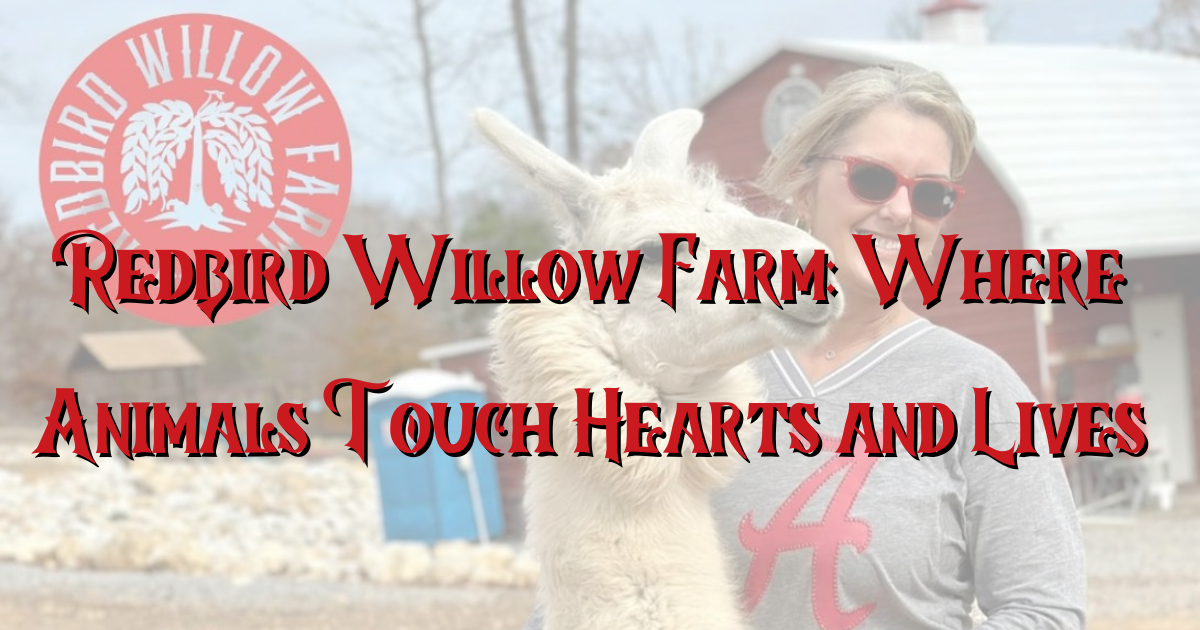Not that any animal farm is “ordinary,” but Redbird Willow Farm of Calhoun County is uniquely wonderful. Beyond the opportunity to interact with friendly, lovable domestic animals like alpacas, llamas, ponies, rabbits, goats, and even two curious emus, the farm’s deeper purpose resonates as you walk around the grounds. It’s built on the memory of a lost loved one, the steadfast faith in a higher power, and the strength to move forward found in embracing and celebrating love. When you meet the animals of Redbird Willow Farm, it will be evident that each one has not only been on the receiving end of tender love and care but is open to sharing love in its own special way with visitors.
Some of the general offerings at Redbird Willow Farm include farm tours, photo shoots, birthday or occasion parties, and even goat and llama yoga. They also plan special events around certain holidays, like the Llama Llama Red Pajama Halloween Party they hosted in October, which drew around 1,000 visitors. Their upcoming holiday event will take place Sunday, December 17 from 2 pm to 4 pm called Santa Cookies and Crafts. For a $5 fee, participants will receive free hot chocolate and cookies, kids can have their pictures made with Santa (DIY), and adorable animals will be available for your admiration. For an additional fee, kids can purchase and complete a craft kit on-site. No reservations are required for this event. Annually, Redbird Willow Farm also hosts a Llamapalooza event in April which has grown in popularity with each passing year.
The farm was started in 2020 on land owned by Michelle Hornsby and her husband Ray. They originally purchased goats to help clear the property of brush. As Michelle walked me around the grounds, she shared her poignant story of losing her adult son Justin to suicide in 2017. They found him in a particular spot on the grounds, and after that, the area became a place of sorrow and fear. After some deliberation of whether or not to sell the property and move away, the Hornsbys decided to continue there, recognizing they had built many good memories with their son there as he grew up and matured.
She shared, “We’ve always embraced the fact that you should run towards the things that are most frightening to be able to manage them and cope with them and heal in as much of a healthy way as you can.” Her husband suggested that they make a memorial area, so they purchased 7 Nigerian and pygmy goats. She laughed, saying that in hindsight, those weren’t the best type of goats for clearing brush.
After donating a lot of time to suicide prevention events and fundraisers, Michelle found herself at a point of being depleted. She sought solace and healing by connecting with other grieving mothers to share their stories of loss. She also found that the hands-on work involved with caring for these newly acquired animals was therapeutic. “Cleaning up after the goats, shoveling poop….I had a lot of Lt. Dan moments (referencing the movie Forrest Gump), where he’s on that mast of the boat and yelling at God–I had all those moments here.”
Having received comfort in caring for the goats, she got a llama for her niece, which they also kept on their property. The llama came from Oklahoma, already named Justine (which almost seemed like a sign, given their son’s name was Justin). As llamas are pack animals, they would have had to find a mate quickly. Fortunately, Justine was pregnant. Once she’d come to live on their farm, she gave birth, ironically, on International Bereaved Mothers Day. The birth took place within close proximity to the spot where Justin had been found. Michelle saw it as a confirmation that they were on the right path. They named the baby Willow, and a subsequent llama was born on the farm. As they began adding animals to their property, their future path unfolded.
“I found that the llamas are just majestic and they have a sense about them. They are the ones I really fell in love with. They are very intuitive, they’re very nurturing. They are a very skittish animal, but once you gain their trust and begin to work with them and train with them–it’s a very unique bond.”
Her husband erected a 30-foot cross at the highest point of the farm, and Michelle quit her marketing job to run the farm full-time. As she put it, “We began to come back full circle and reclaim our faith. As we reclaimed it, we came out so much stronger on the other side.”
They opened it to the public and welcomed any visitors to come and interact with the animals. Her heart is particularly open to those who have suffered the loss of a loved one to suicide or other means, had loved ones struggling with mental health issues, or folks who have struggled themselves or just need a place for quiet reflection.
Visitors to the farm are allowed to roam its grounds for a $10 fee, purchase feed to offer to the animals for an additional amount, or book a guided tour. The guided tours allow staff like Michelle to share their testimony with others and help anyone in need of emotional support to connect and locate available resources for further healing. Michelle and the staff take some of the animals to nursing homes, have worked with a veteran group, and have seen addiction groups visit the farm, as well as Rainbow Omega, and beyond.
They have added multiple types of animals that people can connect with like 6 rescue cats (in honor of their son, who loved cats), 2 emus (Ebenezer and Eloise), a Highland Scottish cow and Ebu cows, chickens, a tortoise, a hedgehog, peacocks, llamas, alpacas, miniature horses, rabbits, pygmy and silky fainting goats, miniature donkeys, Valais blacknose sheep, ducks, and an adorable joey. All in all, the farm houses over 85 animals.
Each of the animals has unique behaviors and personalities. Michelle told me that the emus, who have been at the farm a year now, didn’t want anything to do with people at first. But now they are very social, funny, and love to peck at shiny objects. It didn’t take me but a few minutes of coaxing to be able to interact with the emus myself, who seemed very drawn to my fleece jacket. Michelle also picked up a Flemish giant rabbit for me to pet, as I’m particularly fond of rabbits.
The most interesting encounter I had was with the farm’s newest addition, a 10-month-old baby kangaroo. He was named Kevin after the son of another grieving mom who is Michelle’s personal friend. Kevin the joey is still being bottle-fed and spends his days in a special enclosure, and his evenings in Michelle’s home. He was very friendly and fun to cuddle with!
When asked about the difference between alpacas and llamas, Michelle explained that alpacas have a smaller build, are a bit more skittish (being prey animals), and are not as interactive unless you feed them. They are primarily from South America and used for their fleece, which is naturally hypoallergenic. At the farm, they sheer their alpacas annually and so far have made dryer balls and bird balls from the wool, which are available for sale in their gift shop. Some of the animals on the farm, including the alpacas, are named after things Justin her son loved, like the alpaca named Ringo (after the Beatles) or Finnegan (because her son enjoyed Irish pubs).
The llamas are bigger in build, have longer faces, and have curved ears like bananas (while alpacas have small pointed elf-like ears). They are used to carry things up to 150 pounds in their native Peru. Alpacas are favorites of the farm to take to places like nursing homes as they are tidier animals than some of the others.
Michelle showed me an area going up the hill where a pavilion sits, sheltering picnic tables. They have had events like “llama lunches,” and “llama hikes” where folks can eat and walk with the llamas while exploring the property. Further down the slope sits a pond they just created this past summer, which they plan to stock with fish. There are ideas in the works for future possibilities like overnight camping with the llamas.
As we walked about, I was introduced to a woman named Carrie Sexton, who visits the farm periodically. Her son took his own life in May at the age of 24. At some point, Carrie had gone to the Alpaca Day, met and chatted with Michelle, and been invited to visit the farm any time to find peace and solace. She said, “It’s amazing how an emu can help you have a much better day. And she has a pond back there where I sat one night talking to the ducks. Those ducks have heard it all! Animals are always happy to see you.”
That’s just one of many examples of people whose lives have been touched through Redbird Willow Farm. By appointment/request, the farm’s doors are open for anyone to not only seek entertainment from the abundance of heart-warming animals but to also obtain comfort or healing. You’ll also be amazed at the beautiful merchandise for sale in their gift shop, including items made of alpaca wool, various objects featuring redbirds, and other decor. Redbird Willow Farm is located at 1103 Lenlock Lane in Anniston, Alabama. For more information about the farm or to schedule a visit, call (256) 239-3067, email them at redbirdwillowfarm@gmail.com or visit their Facebook page.




